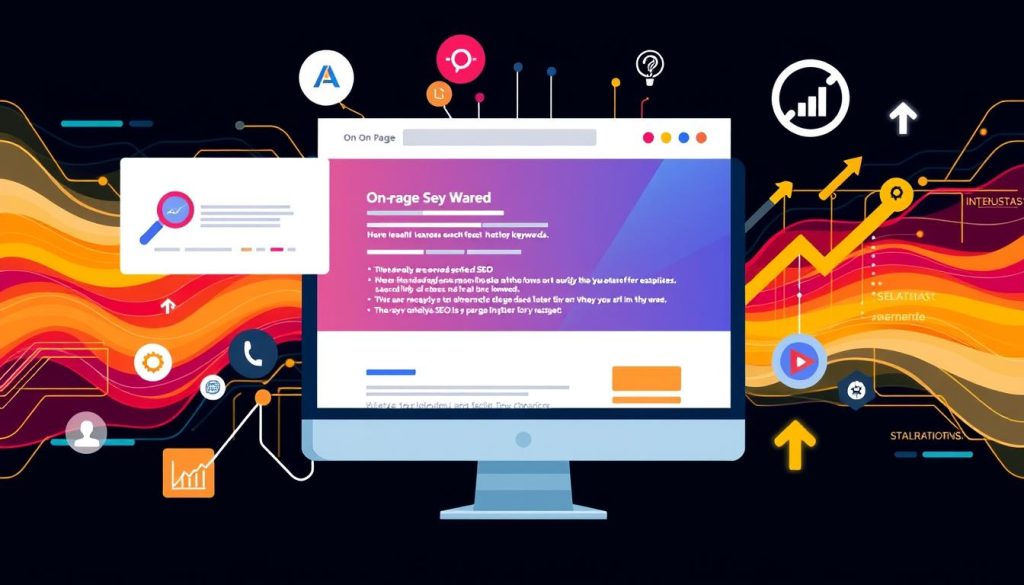In today’s digital world, over 92.4% of searches start on Google. This makes SEO very important for small businesses. But, have you thought about how small businesses can use SEO to stand out and draw in more customers?
SEO helps your website show up higher in search results, bringing more visitors to your site for free. It’s key for small businesses to compete with big ones and get customers without just using ads. By using good SEO strategies, you can get more people to see your site, know your brand better, and make more sales.
Key Takeaways:
- SEO can be a more cost-effective solution than paid advertising for small businesses to attract customers.
- Implementing local SEO strategies can help small businesses reach customers in their geographic area.
- Creating valuable and engaging content can improve your website’s performance and user engagement.
- Optimizing your website’s technical aspects, such as site speed and mobile-friendliness, can significantly impact your search engine rankings.
- Regularly monitoring and analyzing your SEO performance is crucial to identify areas for improvement and stay ahead of the competition.
What is SEO and Why is it Important for Small Businesses?
SEO, or search engine optimization, helps your website rank higher in search results. This brings more visitors to your site without spending on ads. It’s key for small businesses to compete with big ones and find customers.
SEO makes your site appealing to search engines like Google, which handles 92.4% of all searches. By offering the best content, your site can top search results.
The role of SEO for small businesses is huge. Here are some facts:
- Only 0.63% of Google Search users clicked on results from the second page of Google in 2023.
- 46% of all Google searches have local intent, and 97% of search engine users have searched for a local business online.
- Improved SEO ranking can lead to increased web traffic for ecommerce businesses and potentially drive more foot traffic to physical stores.
- SEO can bring thousands of visitors to valuable website pages every month for small businesses, leading to higher revenue.
By focusing on SEO, small businesses can fight against big companies for online space. Good SEO strategies can help your business reach more people, boost website visits, and grow sales.
Understand Your Target Audience and Keyword Research
Finding the right keywords is key to a good SEO plan. You need to know what your target audience is looking for. Doing deep keyword research helps you find the right words to use in your content.
Identify Your Target Audience
First, learn what your audience needs and wants. Use surveys, social media, and website analytics to find out. Knowing what they search for helps you pick the best keywords.
Conduct Keyword Research
Use tools like Google Keyword Planner, SEMrush, and Ahrefs for keyword research. Look for long-tail keywords with the right amount of searches and competition. These keywords are easier to rank for and bring in better traffic.
| Keyword | Monthly Search Volume | Competition Level |
|---|---|---|
| best small business seo strategies | 2,400 | Medium |
| how to do keyword research for small business | 1,600 | Low |
| small business seo tips | 3,100 | High |
Keep doing keyword research and tweaking your strategy to stay on top. Keep up with your audience’s changing needs and search trends. This way, your content stays relevant and valuable.
“Effective keyword research can center content on relevant topics and attract more traffic to a website.”
Optimize Your Website’s On-Page SEO

As a small business owner, making your website SEO-friendly is key. On-page SEO means tweaking things you can control like title tags, meta descriptions, header tags, and content. This helps your site show up better in search results, bringing more visitors to your business.
First, do some keyword research to find out what people are looking for. Use these keywords in your title tags, meta descriptions, and header tags (H1, H2, H3). But remember, your content should be helpful and easy to read, not just full of keywords.
Don’t forget about internal linking. Link relevant pages on your website together to make it easier for users and search engines to navigate. This also helps spread out your site’s authority, making it more likely to rank well.
Also, make sure your site is mobile-friendly and loads quickly. These technical details are important for your site’s ranking and user experience.
| On-Page SEO Element | Optimization Tips |
|---|---|
| Title Tags | Use your target keyword, keep it under 60 characters, and make it compelling |
| Meta Descriptions | Summarize your page’s content, include your target keyword, and keep it under 160 characters |
| Header Tags (H1, H2, H3) | Use relevant keywords, structure your content hierarchically, and make them informative |
| Content | Create high-quality, valuable, and engaging content that addresses your audience’s needs |
| Internal Linking | Link related pages on your website to improve user experience and content hierarchy |
By focusing on your website’s on-page SEO, you can improve your search rankings and draw in more customers.
“Optimizing your website’s on-page SEO is a crucial step in increasing your online visibility and driving more traffic to your small business.”
Create Valuable and Engaging Content

In the world of content marketing, small businesses can really stand out. By making evergreen content that speaks to your audience, you can grow your online presence. This helps bring more people to your website.
First, do some keyword research to find out what your audience is looking for. Use these keywords in your content, like blog posts or videos. This makes your content better and more likely to show up in search results.
- Make content that answers questions or solves problems for your customers.
- Use stories and visuals to make your content stick in people’s minds.
- Try different types of content, like lists or guides, to see what works best.
Creating good content regularly not only helps your SEO. It also builds trust and credibility with your audience. By being seen as a reliable source, you can make your small business a leader in your field.
| Content Type | Benefits | Examples |
|---|---|---|
| Blog Posts | Improve SEO, drive website traffic, establish authority | How-to guides, industry insights, product/service overviews |
| Videos | Engage audience, showcase expertise, improve brand visibility | Product demonstrations, behind-the-scenes, Q&A sessions |
| Infographics | Convey complex information visually, increase shareability | Industry trends, data visualizations, process explanations |
The secret to great content marketing is to keep making content that matters to your audience. This way, you can boost your online presence, get better search rankings, and attract more customers.
Build High-Quality Backlinks

Backlinks are key to your SEO strategy. They are links from other sites to yours. Search engines see them as a sign of trust and authority. Getting backlinks from trusted sources is vital for small businesses to stand out online.
Strategies for Building Valuable Backlinks
To build a strong backlink profile, focus on these strategies:
- Create linkable assets like detailed guides, valuable resources, or informative blog posts. These are things other sites will want to link to.
- Use the “Skyscraper Technique” by finding top content in your field, making it better, and reaching out to linkers.
- Take advantage of guest posting on high-authority sites to get backlinks and boost your brand.
- Join industry-related forums, communities, and directories to build relationships and get backlinks from trusted sources.
- Start an outreach strategy to connect with influencers, bloggers, and site owners in your field. Ask them to link to your content.
The quality of your backlinks is more important than how many you have. Aim for links from authoritative, relevant sites with high domain authority. This will have a bigger impact on your SEO.
“Link building is the process of actively growing the quantity and quality of inbound links to your website from other reputable websites.” – Search Engine Journal
By using a strategic link building approach and getting high-quality backlinks, you can greatly improve your domain authority. This will help your search engine rankings, bringing more traffic and potential customers to your small business website.
Optimize for Local Search

As a small business, focusing on local search is key. Almost half of Google searches are local, and 72% of people visit stores nearby after searching online. This shows how important local SEO is for your success.
First, make sure your Google My Business profile is complete. This free tool helps you manage your online presence. It includes your business name, location, hours, and reviews. It’s also vital to keep your info the same on Yelp, Bing, and Apple Maps for local SEO.
- Claim and optimize your local seo Google My Business listing
- Ensure your business information is consistent across online directories
- Encourage customers to leave positive google my business reviews
Creating content specific to your location can also help. Write blog posts or web pages with keywords like “[city] [service]” or “best [product] in [city].”
Optimizing for local SEO can make your business more visible in search results. This can attract more customers in your area. Remember, almost half of all Google searches are local, so it’s crucial to stand out in local search results.
“In local SEO, having inbound links with relevance and authority can significantly improve domain authority.”
seo strategies for small businesses
As a small business owner, you might feel like you’re up against big companies online. But, search engine optimization (SEO) can help you compete without spending a lot. It just needs a good plan, some effort, and time to see results.
Here are some key seo strategy for small businesses and small business seo tips to help you get started:
- Conduct Thorough Keyword Research: Find out what your audience is searching for. Use Google Search Console to see what keywords bring traffic to your site.
- Optimize Your On-Page SEO: Make sure your page titles, URLs, meta descriptions, and header tags include your target keywords. Keep your keyword use between 1% and 2% to avoid overdoing it.
- Create Engaging, Relevant Content: Focus on making high-quality, useful content for your audience. Regular updates keep your site fresh and can improve rankings.
- Build Quality Backlinks: Get backlinks from trusted, relevant sources. This boosts your site’s authority and credibility with search engines.
- Optimize for Local Search: Claim and optimize your Google My Business listing. Make sure your NAP (name, address, phone) info is the same everywhere. Encourage customer reviews to boost local SEO.
| Metric | Value |
|---|---|
| Percentage of businesses that serve a local clientele requiring Local SEO strategies | Not provided |
| Percentage of SMBs following general best practices for SEO | Not provided |
| Percentage of businesses that utilize Google Business Profiles | Not provided |
| Number of steps outlined for localizing a website for better SEO | 3 |
| Recommendations for inclusion on a Contact page | 4 |
| Advice given on building accurate business listings | 5 |
| Time frame for seeing results from local SEO efforts for small businesses | Not specified |
By following these seo strategy for small businesses and small business seo tips, you can improve your online presence. This will help attract more customers. Remember, SEO takes time and effort. Keep working hard and providing value to your audience to succeed in the competitive SEO world.
Technical SEO Considerations
As a small business owner, making your website technically sound is key. Technical SEO helps improve your site’s speed, mobile friendliness, security, and structure. This boosts your online visibility and makes your site easier to find.
Site Speed Optimization
Google values fast-loading websites. Tools like PageSpeed Insights or GTmetrix can help spot and fix speed issues. Faster load times can be achieved by using caching, optimizing images, and reducing plugin use.
Mobile Optimization
Mobile devices are now the main way people search online. Mobile optimization is essential. Make sure your site works well on mobiles. Google’s Mobile-Friendly Test can help you check and improve your site’s mobile performance.
Secure and Structured Website
Using HTTPS and a well-organized site are also important for technical SEO. A secure, easy-to-navigate site builds trust with users and helps search engines understand your content better.
Improving these technical aspects of your website lays a solid base for your SEO efforts. It helps your small business rank higher, attract more visitors, and succeed online.
“Technical SEO optimization ensures search engines can crawl, index, and understand a website efficiently, emphasizing fast loading times and responsive design.”
Monitor and Analyze Your SEO Performance
Tracking your SEO progress is key to long-term success. Tools like Google Search Console and Google Analytics help you see how your site is doing. Google Search Console shows data on impressions, clicks, and keywords. Google Analytics gives insights into how users interact with your site.
By regularly checking your SEO metrics, you can make smart choices. Look at things like organic traffic, bounce rate, and keyword rankings. This helps you see how your site is doing and make it better.
Tools like the Search Statistics module in AIOSEO offer a detailed look at your site’s search performance. It works with Google Search Console to show you search impressions, clicks, and more. With this info, you can find your best content, fix technical issues, and boost your site’s visibility.
FAQ
What is SEO and why is it important for small businesses?
SEO stands for Search Engine Optimization. It helps your website show up higher in search results. This is key for small businesses to compete with big ones without spending a lot on ads.
How do I conduct effective keyword research for my small business?
Finding the right keywords is the first step in SEO. Look for what your customers are searching for. Then, use these keywords in your website’s content in a natural way.
What are the key on-page SEO elements I should optimize?
Focus on title tags, meta descriptions, header tags, and internal links. These help search engines understand your website better.
How can I create valuable and engaging content for my small business?
Make content that’s informative and interesting. It should answer your audience’s questions and provide lasting value. This is key for SEO success.
What is the importance of building high-quality backlinks for my small business?
Backlinks are like votes of confidence from other websites. They show search engines your site is trustworthy. Getting backlinks from good sources boosts your SEO.
How do I optimize for local search as a small business?
For local customers, create a Google My Business profile. Get online reviews and keep your business info consistent online. This helps with local SEO.
What are the key technical SEO considerations for small businesses?
Focus on website speed, mobile-friendliness, and security (HTTPS). Also, use header tags correctly. These improve user experience and search rankings.
How do I monitor and analyze my small business’s SEO performance?
Use tools like Google Search Console and Google Analytics. They help track your site’s performance and user behavior. This shows how well your SEO is working.
Source Links
- SEO tips for small businesses – https://www.bdc.ca/en/articles-tools/marketing-sales-export/marketing/seo-small-businesses-10-ways-rank-higher
- 5 Tips to Maximize Your Small Business SEO – https://www.salesforce.com/blog/small-business-seo-potential/
- Small Business SEO: 14 SEO Tips for Small Businesses – https://www.semrush.com/blog/small-business-seo/
- SEO for Small Businesses: Everything You Need to Know – https://www.investopedia.com/seo-for-small-businesses-8584627
- 7 Benefits of SEO for Small Businesses – https://aioseo.com/benefits-of-seo-for-small-businesses/
- Why Is SEO Important for Small Businesses? | Hennessey Digital – https://hennessey.com/seo/local/why-is-seo-important-for-small-businesses/
- 8 SEO keyword research and targeting strategies to supercharge growth | Modus – https://www.modusagency.com/blog/8-seo-keyword-research-and-targeting-strategies-to-supercharge-growth/
- How to Do Keyword Research for SEO: A Beginner’s Guide – https://blog.hubspot.com/marketing/how-to-do-keyword-research-ht
- SEO Starter Guide: The Basics | Google Search Central | Documentation | Google for Developers – https://developers.google.com/search/docs/fundamentals/seo-starter-guide
- 8 SEO Tips for Small Businesses to Grow Online – For Free – https://www.theupsstore.com/small-business-services/small-business-blog/small-business-blog/2023/08/seo-tips-for-small-businesses
- 7 On-Page SEO Strategies for Small Businesses – https://www.timify.com/en/blog/seven-on-page-seo-strategies-for-small-businesses/
- Best SEO Strategies for Small Business Owners [Tips to Get More Customers] | Slam Media Lab – https://www.slammedialab.com/post/seo-small-business-tips
- How to Create an Effective Small Business Content Marketing Strategy | BizIQ – https://biziq.com/blog/how-to-create-an-effective-small-business-content-marketing-strategy/
- Content Marketing for Small Businesses: Top 10 Ideas & Tips – https://outgrowco.medium.com/content-marketing-for-small-businesses-top-10-ideas-tips-8d83be66b93c
- How to Get High Quality Backlinks in 2024 (7 Top Strategies) – https://backlinko.com/high-quality-backlinks
- How to Build a Backlink Strategy for Entrepreneurs – https://amecreatives.com/backlink-strategy-for-entrepreneurs/
- A Comprehensive Guide to Local SEO in 2023 – https://blog.hubspot.com/marketing/local-seo
- Local SEO: The Definitive Guide (2024) – https://backlinko.com/local-seo-guide
- What Is Local SEO? A Simple How-To Guide for Small Businesses – https://www.freshbooks.com/hub/marketing/local-seo?srsltid=AfmBOor_61_X9agTdg9v97Abc7EBVB0WetU53X2F1qIuMKrqdrM-_0uN
- 15 Essential SEO Tips For Small Businesses To Dominate In 2024 | Johnson Jones Group – https://johnsonjonesgroup.com/seo-tips-for-small-businesses/
- Small Business Local SEO: A Common Sense Guide | Collaborada – https://www.collaborada.com/blog/local-seo-small-business-tips
- Local SEO for Small Business – Ultimate Guide – https://www.boostability.com/resources/local-seo-for-small-business-guide/
- 7 Effective SEO Strategies For Small Businesses [2024] – https://www.agiledigitalagency.com/blog/top-seo-tactics-small-business-success/
- Small Business: 8 SEO Tips to Improve Ranking – https://wp-rocket.me/blog/small-business-seo-tips/
- Small Business SEO Tools [Tips, Resources, List] | Slam Media Lab – https://www.slammedialab.com/post/small-business-seo-tools
- A Simple Guide to SEO Analytics for Small Businesses – https://aioseo.com/simple-guide-to-seo-analytics/
- Local SEO for Small Business: Best SEO Strategies in 2024 – https://www.score.org/utah/resource/eguide/local-seo-small-business-best-seo-strategies-2024




